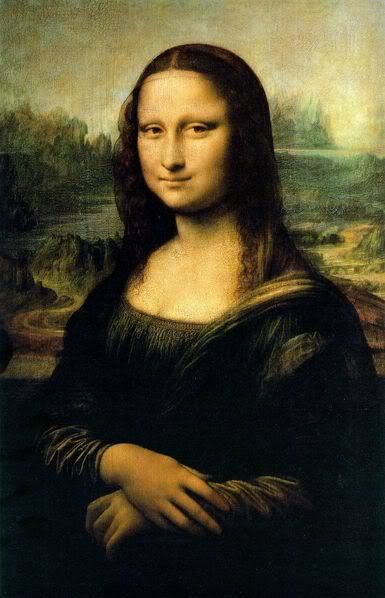 How Leonardo da Vinci used rudimentary pigments in 1503 to create such subtle shadows and light on the Mona Lisa has long baffled art historians. Now French researchers are "using X-ray fluorescence spectroscopy to isolate and study each ultra-thin layer of paint and glaze da Vinci used" to create the effect he was seeking, according to recent new stories.
How Leonardo da Vinci used rudimentary pigments in 1503 to create such subtle shadows and light on the Mona Lisa has long baffled art historians. Now French researchers are "using X-ray fluorescence spectroscopy to isolate and study each ultra-thin layer of paint and glaze da Vinci used" to create the effect he was seeking, according to recent new stories. By beaming x-rays on the Mona Lisa without removing it from the wall on which it is mounted in Paris' Louvre Museum, scientists found that da Vinci used a Renaissance painting technique known as sfumato, intricately mixing thin layers of pigment, glaze and oil to create the appearance of lifelike shadows and light. Scientists now believe that da Vinci used up to 30 layers of paint on his works.
While this research may solve one mystery about the Mona Lisa, others remain, like: "who is this enigmatic woman" and why does she hold her subtle half-smile? To these mysteries we can add another: what did this mysterious woman and da Vinci like to eat?
According to one researcher who studied the culinary habits of fifteenth and sixteenth century Italy, some Renaissance favorites were Risi e Bisi, Saffron Risotto with Duck and Mushrooms, and Spinach Soup with Hazelnuts. Although those recipes would be impossible to duplicate today, this one for Saffron Risotto with Mushrooms from the New York Times might just give you a sense of how and what Leonardo da Vinci ate.
4 cups beef or chicken stock
1/8 teaspoon ground saffron
3 tablespoons unsalted butter
2 tablespoons olive oil
1/4 cup finely minced scallions
1/4 cup finely minced onions
1 pound fresh wild mushrooms, trimmed, cleaned and sliced (see note)
1 1/2 cups Italian Arborio rice
Salt and freshly ground black pepper to taste
3/4 cup freshly grated Parmigiano-Reggiano cheese
Place stock in a heavy saucepan, and over medium heat bring to a simmer. Add saffron, stir, and leave to simmer very slightly.
Meanwhile, in a larger saucepan over medium heat, melt 1 tablespoon butter in olive oil. When foam subsides, add scallions and onions, and cook, stirring frequently, until softened and yellow but not browned. Add mushrooms and saute, stirring occasionally, until liquid has evaporated.
Add rice to mushrooms, and cook, stirring to coat well, with butter and oil. Add approximately 3/4 cup of simmering stock to rice and mushrooms. Stir well and continue to cook, stirring occasionally, until rice has absorbed most of stock. Continue adding stock to rice by the half-cupful, adding only after rice has absorbed previous addition. As cooking continues, you will have to stir more frequently. After 25 to 30 minutes, all the stock should be absorbed, and rice should be tender but still chewy.
Remove from heat. Add salt and pepper to taste. Stir in remaining butter and 1/4 cup of Parmigiano-Reggiano. Serve immediately, passing the rest of the cheese.
Thanks for stopping by THE HISTORY CHEF! For a free excerpt of my new book from Simon and Schuster click here
